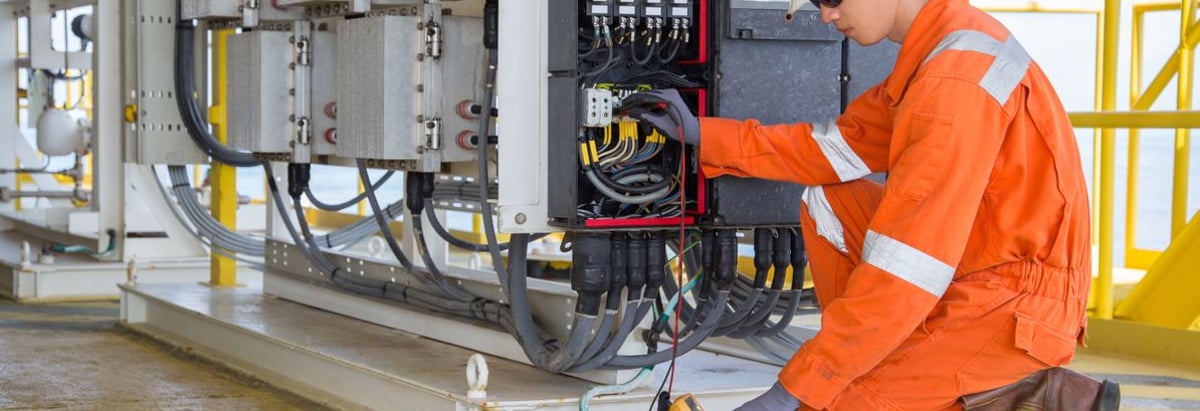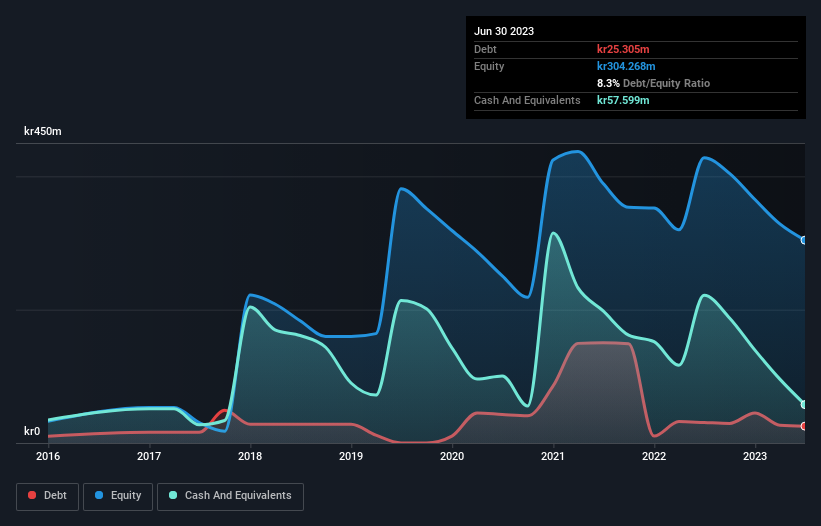
Some say volatility, rather than debt, is the best way to think about risk as an investor, but Warren Buffett famously said that 'Volatility is far from synonymous with risk.' So it seems the smart money knows that debt - which is usually involved in bankruptcies - is a very important factor, when you assess how risky a company is. Importantly, Climeon AB (publ) (STO:CLIME B) does carry debt. But is this debt a concern to shareholders?
What Risk Does Debt Bring?
Generally speaking, debt only becomes a real problem when a company can't easily pay it off, either by raising capital or with its own cash flow. Ultimately, if the company can't fulfill its legal obligations to repay debt, shareholders could walk away with nothing. However, a more common (but still painful) scenario is that it has to raise new equity capital at a low price, thus permanently diluting shareholders. Of course, plenty of companies use debt to fund growth, without any negative consequences. When we examine debt levels, we first consider both cash and debt levels, together.
View our latest analysis for Climeon
What Is Climeon's Debt?
The image below, which you can click on for greater detail, shows that Climeon had debt of kr25.3m at the end of June 2023, a reduction from kr30.7m over a year. But it also has kr57.6m in cash to offset that, meaning it has kr32.3m net cash.

How Healthy Is Climeon's Balance Sheet?
We can see from the most recent balance sheet that Climeon had liabilities of kr61.2m falling due within a year, and liabilities of kr33.2m due beyond that. Offsetting this, it had kr57.6m in cash and kr63.2m in receivables that were due within 12 months. So it can boast kr26.5m more liquid assets than total liabilities.
This surplus suggests that Climeon has a conservative balance sheet, and could probably eliminate its debt without much difficulty. Succinctly put, Climeon boasts net cash, so it's fair to say it does not have a heavy debt load! The balance sheet is clearly the area to focus on when you are analysing debt. But it is Climeon's earnings that will influence how the balance sheet holds up in the future. So when considering debt, it's definitely worth looking at the earnings trend. Click here for an interactive snapshot.
Over 12 months, Climeon made a loss at the EBIT level, and saw its revenue drop to kr21m, which is a fall of 15%. That's not what we would hope to see.
So How Risky Is Climeon?
By their very nature companies that are losing money are more risky than those with a long history of profitability. And in the last year Climeon had an earnings before interest and tax (EBIT) loss, truth be told. And over the same period it saw negative free cash outflow of kr117m and booked a kr124m accounting loss. Given it only has net cash of kr32.3m, the company may need to raise more capital if it doesn't reach break-even soon. Even though its balance sheet seems sufficiently liquid, debt always makes us a little nervous if a company doesn't produce free cash flow regularly. There's no doubt that we learn most about debt from the balance sheet. But ultimately, every company can contain risks that exist outside of the balance sheet. For example Climeon has 5 warning signs (and 3 which are potentially serious) we think you should know about.
When all is said and done, sometimes its easier to focus on companies that don't even need debt. Readers can access a list of growth stocks with zero net debt 100% free, right now.
If you're looking to trade Climeon, open an account with the lowest-cost platform trusted by professionals, Interactive Brokers.
With clients in over 200 countries and territories, and access to 160 markets, IBKR lets you trade stocks, options, futures, forex, bonds and funds from a single integrated account.
Enjoy no hidden fees, no account minimums, and FX conversion rates as low as 0.03%, far better than what most brokers offer.
Sponsored ContentNew: AI Stock Screener & Alerts
Our new AI Stock Screener scans the market every day to uncover opportunities.
• Dividend Powerhouses (3%+ Yield)
• Undervalued Small Caps with Insider Buying
• High growth Tech and AI Companies
Or build your own from over 50 metrics.
Have feedback on this article? Concerned about the content? Get in touch with us directly. Alternatively, email editorial-team (at) simplywallst.com.
This article by Simply Wall St is general in nature. We provide commentary based on historical data and analyst forecasts only using an unbiased methodology and our articles are not intended to be financial advice. It does not constitute a recommendation to buy or sell any stock, and does not take account of your objectives, or your financial situation. We aim to bring you long-term focused analysis driven by fundamental data. Note that our analysis may not factor in the latest price-sensitive company announcements or qualitative material. Simply Wall St has no position in any stocks mentioned.
About OM:CLIME B
Moderate with adequate balance sheet.
Similar Companies
Market Insights
Community Narratives



